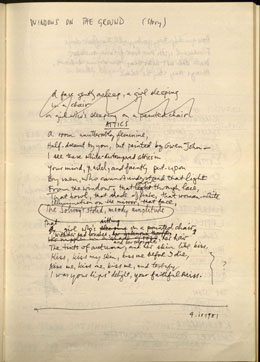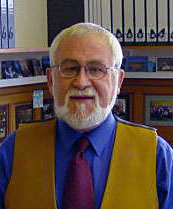Visible Ink

An extensive catalogue of the drafts, manuscripts and letters of Douglas Dunn will be freely accessible online for the first time from tomorrow (Thursday 22 November 2012), improving access to the poet’s hand-written workings for fans, writers and scholars alike.
The University of St Andrews will launch the Douglas Dunn collection catalogue to celebrate the 70th birthday of one of the UK’s best-loved poets – mentored by Philip Larkin, described by Melvyn Bragg as “among the finest of our poets”, and awarded an OBE for his services to literature.
To mark this occasion the University, where Dunn taught English from 1989 to 2008, has invited Dunn to deliver its prestigious ‘Friends of the Library’ lecture on the subject of ‘The Writer in the Library’, Thursday, 17.15 hours, in the University of St Andrews’ Arts Lecture Theatre. This lecture is free and open to all.
In the new digital age, the Dunn archive is of near-unique historical importance, in that it may well turn out to be one of the last paper archives to span the entire working life of a significant British writer acquired by a University Library. It reveals an intimate portrait of the writer’s false starts, hesitant jotting of rough ideas, brutal crossing-outs, and gradual re-drafting of some of the most tender and moving love poems of the second half of the twentieth century.

Of the workings and re-workings the archive reveals, Douglas Dunn said:
“I have always believed that one of the purposes of revision is to expunge anything tending towards sentimentality – anything tending towards over-statement or another form of sentimentality which is wilful under-statement. You simply have to get the tone right, you have to get the pitch right.”
This extensive archive also includes letters from many notable writers including George Mackay Brown, Ted Hughes and Seamus Heaney, and is held in the University Library’s Special Collections.
Douglas Dunn has long belonged in libraries – he was educated at the Scottish School of Librarianship, and worked as a librarian before graduating with a First Class Honours degree from the University of Hull. He later worked in the Brynmor Jones Library under Philip Larkin. However from tomorrow the University of St Andrews Library will for the first time share not his working life, but his life’s work (so far) – with an electronic catalogue accessible to anyone, anywhere in the world.
The catalogue was funded by the Carnegie Trust of Scotland, took six months to prepare, and is fully searchable by members of the public who can then request to view the papers held in the collection.
Douglas Dunn is the author of more than a dozen books including the highly acclaimed Terry Street, St Kilda’s Parliament, Elegies and The Donkey’s Ears. He won Whitbread Book of the Year in 1985, and has also won the Geoffrey Faber Memorial Prize, the Hawthornden Prize, a Cholmondeley Award, and several Scottish Arts Council Publication Awards.
Notes to News Editors
The online archive catalogue also contains records for many manuscript collections, including the papers of other literary figures such as Willa Muir and Andrew Lang, eminent scientists including James Gregory and James David Forbes, historian David Hay Fleming, philanthropist and paper-maker David Russell, Roman Catholic Modernists, the papers of numerous University academics, and archives from local Fife businesses, estates, churches and burghs. See www.st-andrews.ac.uk/specialcollections/archives.
It also includes institutional records of the University itself, known as Muniments, including the 1413 foundation bull from Pope Benedict XIII.
This new resource will be a valuable tool for accessing the wealth of research potential in the Special Collections manuscripts and muniments.
Details of the Friends of the Library.
The University of St Andrews is currently celebrating its 600th Anniversary with a £100m fundraising campaign. A central strand of that campaign is a £10 million fundraising target to develop a new Centre for Special Collections. To give your support, go to www.st-andrews.ac.uk/600/donate
Category Research